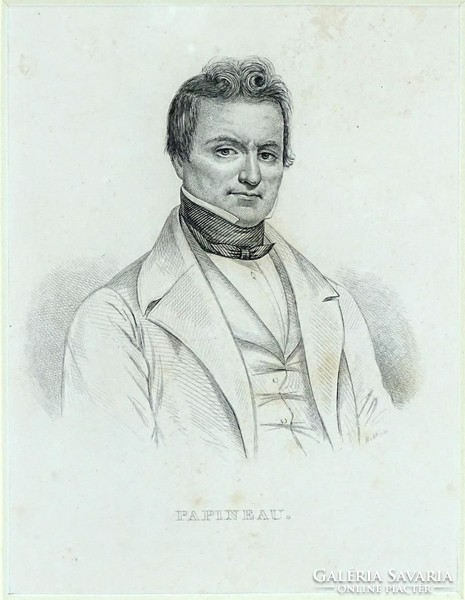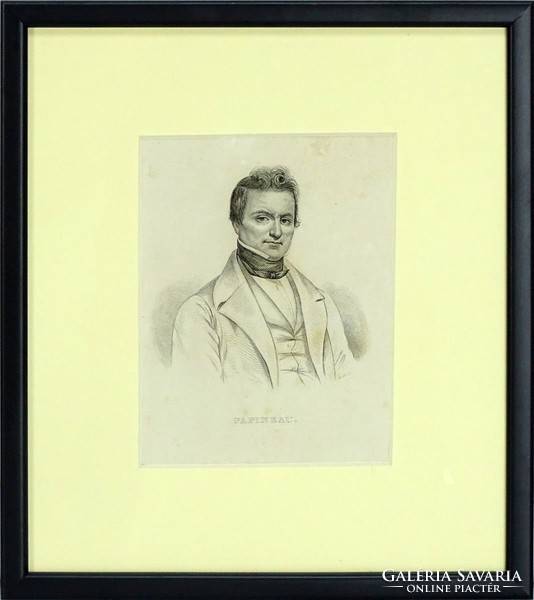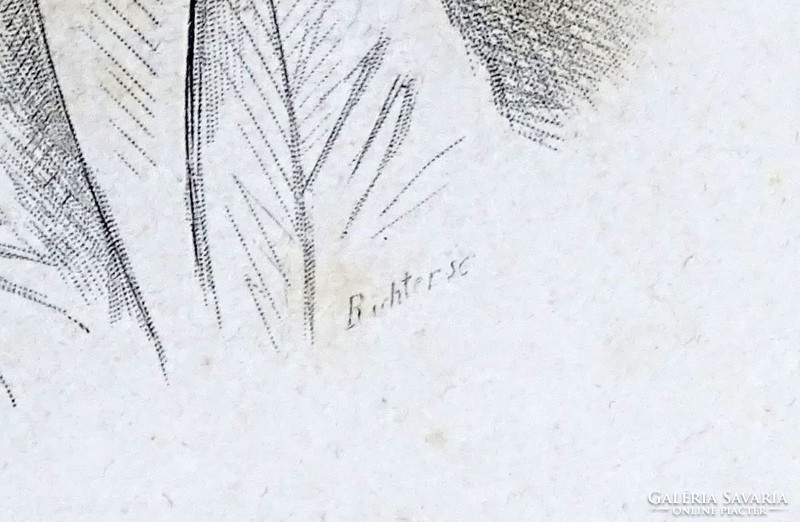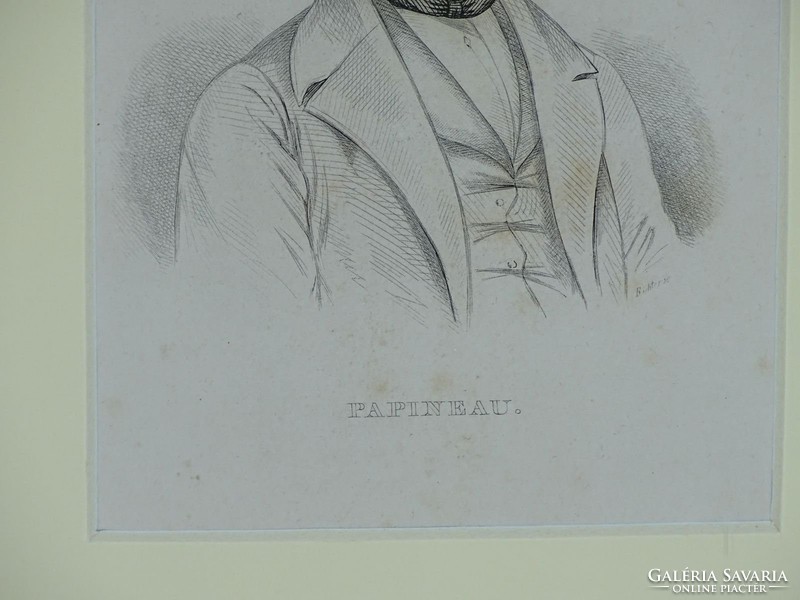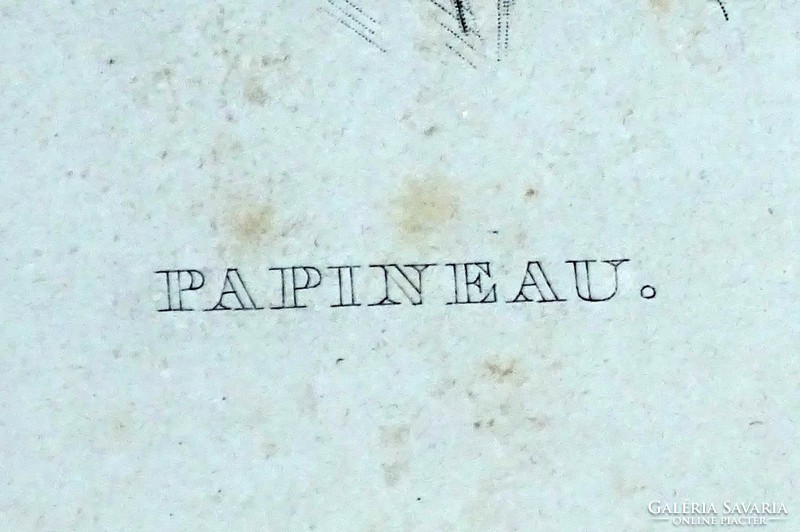0I857 Antik acélmetszet PAPINEAU
Termék információk
| Feltöltés ideje: 2023. december 04. |
| Termékkód: 1364516 |
| Megtekintések: 102 |
| Megfigyelők: 0 |
| Ajánlatok: 0 ajánlat |
Eladó adatai
antikvitasok (2998)
![]() BUDAPEST
BUDAPEST
Hitelesített felhasználó
Pozitív értékelések: 99.84%
Utolsó belépés: Tegnap, 21:22
Regisztráció: 2013. március 05.
Miért választják a vásárlók a Galéria Savariát?
Tudja meg, milyen lépésekkel tesszük biztonságosabbá és kényelmesebbé online piacterünk használatát. Részletek
Tudja meg, milyen lépésekkel tesszük biztonságosabbá és kényelmesebbé online piacterünk használatát. Részletek
| Téma: | portré |
| Eredetiség: | eredeti |
Szépen keretezett, paszpartuban és üveglap mögött található hibátlan, ajándékozható állapotban lévő jelzett acélmetszet portré.
A képen látható személy:
Louis-Joseph Papineau
Jelzés:
RICHTER sc.
Szélesség: 27 cm
Magasság: 31 cm
Súly: 0.62 kg
Portré mérete: 13 x 16,5 cm.
-
Louis-Joseph Papineau
From Wikipedia, the free encyclopedia
For the 20th-century Canadian parliamentarian, see Louis-Joseph Papineau (Canadian parliamentarian).
Louis Joseph Papineau
Born
October 7, 1786
Montreal, Quebec Died September 23, 1871 (aged 84)
Montebello, Canada Nationality Lower Canadian Occupation Lawyer, Member of Provincial Parliament, Speaker of the House of Assembly Signature Louis-Joseph Papineau (October 7, 1786 – September 23, 1871), born in Montreal, Quebec, was a politician, lawyer, and the landlord of the seigneurie de la Petite-Nation. He was the leader of the reformist Patriote movement before the Lower Canada Rebellion of 1837–1838. His father was Joseph Papineau, also a famous politician in Quebec. Papineau was the eldest of eight children[1] and was the grandfather of the journalist Henri Bourassa, the founder of the newspaper Le Devoir.[2]Contents- 1 Speaker of the Legislative Assembly
- 2 Childhood and education
- 3 Leader of the Patriotes
- 4 In exile
- 5 Return to politics
- 6 Family
- 7 Bibliography
- 8 See also
- 9 References
- 10 External links
- Amédée Papineau (1819 -1903) – heir of Louis-Joseph;
- Lactance Papineau (1822 -1862) – died in a mental institution;
- Ézilda Papineau (1828 -1894) – suffering from dwarfism, did not have any children and stayed all her life in Montebello, Quebec ;
- Azélie Papineau (1834 - 1869) – married the painter and architect Napoleon Bourassa (1827-1916), mother of Henri Bourassa, a famous journalist.[13]
- "A Chronology of the Life of Louis-Joseph Papineau", Manoir-Papineau National Historic site of Canada, Parks Canada
- Ouellet, Fernand (1972). "Papineau, Louis-Joseph". In Hayne, David. Dictionary of Canadian Biography. X (1871–1880) (online ed.). University of Toronto Press.
- Fernand Ouellet. "Louis-Joseph Papineau: A Divided Soul", in Canadian Historical Association, 11, Ottawa, 1960
- James Marsh. Papineau, Louis-Joseph, in the Canadian Encyclopedia
- Edmund Bailey O'Callaghan. "A Biographical Sketch of the Hon. Louis Joseph Papineau, Speaker of the House of Assembly of Lower Canada", in Sentinel, Saratoga Springs, 1838
- Gustave Proulx. Le Combat magnifique: Louis-Joseph Papineau. Montréal: Les Presses de "La Presse", 1973. 124 p. Without ISBN
- Thomas Storrow Brown. "Brief sketch of the life and times of the late Hon. Louis-Joseph Papineau", in New Dominion Monthly, 1872, January 1872, 20 pages
- Johnny-Normand Pickering [-LeBlanc] : Le Mémorial Papineau, Éditions du Fleuve, Montréal, 1989
- Quebec nationalism
- History of Quebec
- Timeline of Quebec history
- Denis-Benjamin Papineau
- Amédée Papineau
- Société des Fils de la Liberté
- Ouellet, Fernand (1972). Louis-Joseph Papineau A Divided Soul. Ottawa: The Canadian Historical Association.6
- "Bibliothèque nationale du Québec.". Louis-Joseph-Amédée Papineau. Government of Quebec. Retrieved December 31, 2012.
- Ouellet,Fernand (1972) Louis-Joseph Papineau A Divided Soul. Ottawa: The Canadian Historical Association.6
- Ouellet, Fernand (1972). Louis-Joseph Papineau A Divided Soul. Ottawa: The Canadian Historical Association.
- Ouellet,Fernand (1972). Louis-Joseph Papineau A Divided Soul. Ottawa: The Canadian Historical Association.
- Ouellet,Fernand (1972). Louis-Joseph Papineau A Divided Soul. Ottawa: The Canadian Historical Association
- Bothwell, Robert. The Penguin History of Canada Toronto: Penguin Canada, 2006: 171.
- Ouellet,Fernand (1972). Louis-Joseph Papineau A Divided Soul. Ottawa: The Canadian Historical Association.17
- Barry M. Gough (28 October 2010). Historical Dictionary of Canada. Scarecrow Press. p. 67. ISBN 978-0-8108-7504-3. Retrieved 6 July 2013.
- Ouellet, Fernand (1972). Dictionary of Canadian Biography – Volume X (1871-1880). Retrieved 6 July 2013.
- Louis-Joseph Papineau. Canadian Register of Historic Places. Retrieved August 1, 2011.
- Manoir Papineau. Canadian Register of Historic Places. Retrieved August 1, 2011.-1.13972 French website on M" Papineau's family
Forrás: en.wikipedia.org
Garanciális feltételek
| Garancia: örökös |
Fizetési opciók
| Banki előre utalás |
| Készpénz |
| Postai utánvétel |
| PayPal |
Szállítási opciók
| Szállítás innen: Magyarország Feldolgozási idő: 1-2 munkanap A feldolgozási idő megmutatja, hogy az eladónak a fizetéstől számítva mennyi időre van szüksége a tárgy becsomagolásához és feladásához. Ez alapján tájékozódhat a vevő, hogy a fizetést követően mikor várhatja a csomag feladását. | |
| Személyes átvétel | Budapest IX. |
| MPL - csomagautomata | 1650 HUF |
| MPL - házhozszállítás | 1800 HUF |
| PostaPont | 1650 HUF |
Kérdése van a termékkel kapcsolatban? Írjon az eladónak.
